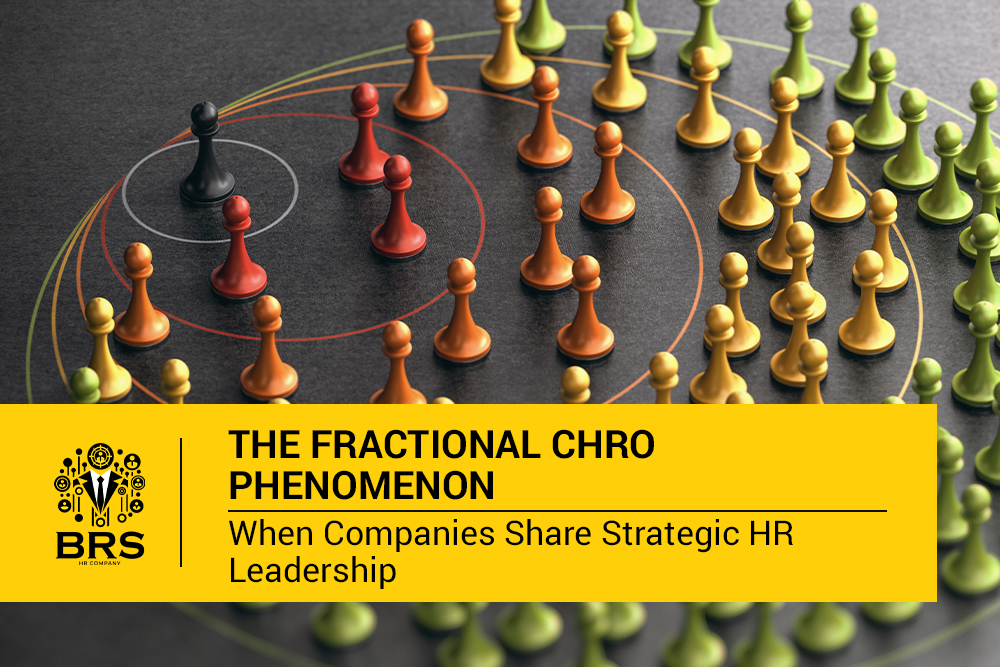In today’s evolving business landscape, a growing number of small and mid-sized companies are discovering a powerful alternative to traditional HR leadership models. Rather than each hiring their own full-time Chief Human Resources Officer (CHRO), these organizations are turning to fractional CHRO arrangements through specialized HR outsourcing providers. This innovative approach allows multiple companies to share high-level strategic HR leadership, accessing C-suite expertise that would otherwise remain beyond their financial reach. The fractional CHRO phenomenon represents one of the most significant yet underexplored trends in modern HR outsourcing.
Understanding the Fractional CHRO Model
The fractional CHRO model operates on a straightforward principle: multiple companies share the cost, time, and expertise of a single, highly qualified HR executive through a structured outsourcing arrangement. Unlike traditional consulting relationships that provide temporary guidance, fractional CHROs maintain ongoing relationships with each client organization, functioning as genuine executive team members on a part-time basis.
These arrangements typically involve the CHRO spending dedicated time with each organization—perhaps one or two days per week—while maintaining consistent availability for strategic guidance between formal engagements. The fractional executive attends leadership meetings, participates in strategic planning, guides HR initiatives, and provides continuity of HR leadership without the cost burden of a full-time executive salary.
According to recent industry data, fractional CHRO arrangements have grown by approximately 85% since 2020, with particularly strong adoption among growth-stage companies with 50-250 employees—organizations large enough to need strategic HR leadership but not yet able to justify a full-time executive salary package.
The Economics of Shared HR Leadership
The financial advantages of fractional CHRO arrangements represent a primary driver of their growing popularity among small and mid-sized businesses.
Cost-Benefit Analysis of Fractional Arrangements
Full-time CHRO compensation packages typically range from $180,000 to $350,000 annually for organizations in the small to mid-sized category, making this expertise prohibitively expensive for many growing companies. In contrast, fractional arrangements through HR outsourcing providers typically cost between $5,000 and $15,000 monthly, depending on time commitment and scope of responsibilities.
This cost structure allows organizations to access senior executive expertise at approximately 30-40% of the cost of a full-time hire, creating accessibility to strategic HR leadership that would otherwise remain out of reach. Additionally, companies avoid the substantial costs associated with executive benefits, equity compensation, and other perquisites typically required for full-time C-suite positions.
Flexibility and Scalability Advantages
Beyond pure cost considerations, fractional CHRO arrangements offer exceptional flexibility as organizations grow and their HR leadership needs evolve. Companies can easily adjust time commitments upward during periods of significant change—such as during growth phases, restructuring, or merger activity—without the permanent cost increase associated with full-time hiring.
This scalability allows growing organizations to match their investment in HR leadership precisely to their current needs and financial capabilities, creating a more responsive cost structure than traditional employment models permit.
When Fractional CHROs Make Strategic Sense
While not appropriate for every organization, fractional CHRO arrangements through HR outsourcing providers offer particular value in specific business contexts:
Growth-Stage Companies
Organizations experiencing rapid growth often reach a critical inflection point where their HR needs transcend the capabilities of mid-level HR management but don’t yet justify a full-time executive. At this stage—typically when companies reach approximately 50-75 employees—fractional arrangements offer an ideal transitional solution.
These companies benefit from strategic guidance during critical scaling decisions while avoiding premature investment in executive overhead. The fractional CHRO can help establish foundational systems and processes that will support continued growth while developing internal HR talent to eventually assume greater responsibility.
Professional Services Organizations
Professional services firms—including law practices, consulting firms, accounting organizations, and specialized agencies—often maintain relatively small employee counts while generating significant revenue per employee. These organizations frequently need sophisticated people strategies despite their modest size, making them ideal candidates for fractional CHRO arrangements.
The specialized nature of talent management in these environments particularly benefits from executive-level expertise applied consistently but part-time, allowing these firms to implement sophisticated retention, compensation, and development approaches without full-time executive costs.
Case Studies: Fractional CHRO Success Stories
Technology Startup Scaling Support
A fast-growing software development company with 85 employees engaged a fractional CHRO through an HR outsourcing provider to navigate their expansion from a single-location operation to a multi-state employer. The company lacked the resources for a full-time executive but needed strategic guidance for:
- Developing multi-state compliance infrastructure
- Creating scalable talent acquisition processes
- Designing competitive compensation structures for different markets
- Establishing leadership development pathways for emerging managers
The fractional CHRO, who divided time between three client organizations, provided two days weekly of dedicated support during the critical six-month expansion phase, then transitioned to one day weekly for ongoing maintenance. This arrangement delivered executive-caliber guidance during a pivotal growth period at approximately 35% of the cost of a full-time hire.
Manufacturing Consortium Shared Leadership
Three small manufacturing companies in related but non-competing sectors collaborated to engage a shared CHRO through an HR outsourcing provider. Each company employed between 75-120 people and faced similar challenges:
- Workforce development in a tight labor market
- Implementation of modernized safety programs
- Union relationship management
- Succession planning for aging leadership teams
By sharing a single fractional CHRO who devoted one day weekly to each organization plus collaborative time addressing common challenges, the consortium accessed expertise none could have afforded independently. The arrangement also created valuable cross-pollination of best practices across the three organizations while maintaining appropriate confidentiality boundaries.
The Expertise Advantage of Fractional Arrangements
Beyond cost considerations, fractional CHRO arrangements through HR outsourcing providers offer a significant expertise advantage over traditional employment models in several dimensions:
Cross-Industry Perspective
Unlike internal hires who typically bring experience from a limited range of employers, fractional CHROs serving multiple clients simultaneously develop exceptional breadth of perspective. They continuously observe different organizational approaches, technologies, and strategies across their client portfolio, bringing each organization the benefit of this diverse exposure.
This cross-pollination effect enables fractional executives to identify innovative approaches and best practices that might never emerge within a single-employer context. Organizations effectively gain access not just to their fractional CHRO’s expertise but to a continuous feed of insights from other environments.
Concentrated Expertise Development
Fractional CHROs typically specialize in specific industry sectors or organizational types, allowing them to develop highly concentrated expertise relevant to their client organizations. Unlike generalist HR leaders who must address all aspects of human resources across an organization, these specialists can focus their professional development and knowledge acquisition on the specific challenges most relevant to their client portfolio.
This specialization creates depth of expertise that often exceeds what organizations could access through traditional employment arrangements, particularly for specialized challenges like:
- High-growth tech company talent strategies
- Healthcare workforce compliance management
- Manufacturing labor relations and safety programs
- Professional services compensation structures
Challenges and Limitations of the Fractional Model
While offering substantial benefits, fractional CHRO arrangements through HR outsourcing providers also present distinct challenges that organizations must navigate:
Integration with Leadership Teams
Fractional executives must overcome the integration challenges inherent in their part-time presence. Building the trust and relationship depth necessary for effective C-suite functioning requires intentional effort from both the fractional CHRO and the existing leadership team.
Successful fractional arrangements typically include structured integration protocols:
- Regular inclusion in executive team communications even on off-days
- Consistent meeting cadence regardless of presence schedule
- Clear expectations regarding accessibility between formal engagement days
- Explicit communication protocols for urgent situations
These practices help mitigate the potential disconnection that part-time engagement might otherwise create.
Confidentiality and Competitive Considerations
Organizations sharing HR leadership must carefully consider confidentiality boundaries and potential competitive conflicts. Effective fractional CHRO arrangements include explicit agreements regarding:
- Information segregation between client organizations
- Documentation of potential conflict scenarios and resolution approaches
- Clear procedures for identifying and addressing emerging competitive overlaps
- Regular conflict review processes as businesses evolve
When properly structured, these arrangements protect sensitive information while still allowing the fractional executive to deliver value across multiple organizations.
How HR Outsourcing Providers Structure Fractional Offerings
HR outsourcing providers offering fractional CHRO services typically employ one of several business models to deliver these arrangements:
Executive Portfolio Management
The most common approach involves the HR outsourcing firm directly employing the executive talent and managing their allocation across multiple client organizations. This model offers several advantages:
- The provider handles administrative burden and relationship management
- Clients benefit from continuity protection if their specific executive becomes unavailable
- The outsourcing firm can provide supplementary resources to support the fractional executive
- Clear contractual structures protect all parties’ interests
Under this model, the HR outsourcing provider typically charges a premium above the executive’s direct compensation to cover management costs and business risk, but delivers additional value through quality assurance and relationship management.
Executive Matchmaking Services
Some HR outsourcing providers operate primarily as matchmakers, connecting independent fractional executives with appropriate client organizations and providing supporting infrastructure. This approach typically involves:
- Rigorous vetting of executive talent
- Careful matching based on industry expertise and cultural fit
- Contractual frameworks that protect all parties
- Support services like billing, compliance guidance, and technology platforms
This model generally involves lower overhead costs but provides less integration with broader HR outsourcing services.
Measuring ROI on Fractional CHRO Arrangements
Organizations implementing fractional CHRO arrangements through HR outsourcing providers report several key metrics for evaluating return on investment:
Strategic Initiative Completion Rates
Companies working with fractional CHROs report an average 42% increase in successful completion of strategic HR initiatives compared to their previous approaches. This improvement stems from the combination of executive-level expertise driving initiative design and the accountability inherent in the outsourced relationship.
Organizations specifically note improvements in complex initiatives requiring cross-functional coordination, such as compensation restructuring, talent development program implementation, and culture transformation efforts—areas where strategic guidance proves particularly valuable.
Reduction in Employment-Related Risk Exposure
Organizations implementing fractional CHRO arrangements report significant reductions in employment-related risk exposure, with an average 36% decrease in legal challenges and compliance issues. This risk reduction stems from the strategic oversight and proactive compliance management that executive-level HR leadership provides.
The risk mitigation benefits often alone justify the cost of fractional arrangements, particularly for organizations operating in complex regulatory environments or undergoing significant workforce changes.
The Future of Fractional HR Leadership
The fractional CHRO phenomenon continues to evolve, with several emerging trends likely to shape its future development:
Integration with Broader HR Outsourcing Packages
Leading HR outsourcing providers increasingly offer fractional CHRO services as components of comprehensive outsourcing packages that include operational HR functions, creating seamless integration between strategic leadership and day-to-day execution.
These integrated models allow organizations to outsource their entire HR function while maintaining executive-level strategic guidance, creating a coherent approach that spans from C-suite strategy to operational implementation.
Technology-Enhanced Engagement Models
Advanced technology platforms are enabling more sophisticated fractional engagement models through:
- Integrated dashboard systems that maintain executive awareness between physical presence days
- Virtual participation capabilities that enhance engagement without requiring physical presence
- Data visualization tools that provide continuous performance insights
- Collaborative workflow systems that maintain momentum on initiatives between executive engagements
These technological enhancements are effectively expanding the capacity of fractional executives to maintain meaningful engagement across multiple organizations simultaneously.
Conclusion: Rethinking HR Leadership Economics
The fractional CHRO phenomenon represents a fundamental rethinking of how organizations access and leverage strategic HR leadership. By sharing executive talent through structured HR outsourcing arrangements, small and mid-sized organizations can access expertise previously available only to larger enterprises with greater resources.
This model creates democratized access to strategic HR leadership, enabling smaller organizations to implement sophisticated people strategies that strengthen their competitive position and support sustainable growth. As the approach continues to mature and evolve, it promises to reshape traditional assumptions about executive resourcing and the relationship between organizational size and HR capability.
For growing organizations seeking to maximize their investment in HR leadership, the fractional CHRO model offers a compelling alternative to traditional employment approaches—one that delivers executive-caliber expertise with unprecedented financial efficiency and flexibility.





